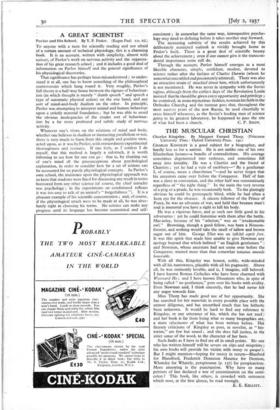- A GREAT SCIENTIST - - - Pavlov and His
School. By Y. P. Frolov. (Kegan Paul. 12S. 6d.)
To anyone with a taste for scientific reading and not afraid of a certain amount of technical physiology, this is a charming book. It is an account, written with simplicity, almost with naïveté, of Pavlov's work on nervous activity and the organisa- tion of his great research school ; and it includes a good deal of information on Pavlov himself and the general significance of his physiological discoveries.
That significance has perhaps been misunderstood ; to under- stand it at all, one has to know something of the philosophical controversies which hang round it. Very roughly, Pavlov's full theory is a half-way house between the rigours of behaviour- ism (in which thought is merely " dumb speech " and speech a type of automatic physical' action) on the one hand, and any sort of mind-and-body dualism on the other. In principle, Pavlov was attempting to interpret animal and human behaviour upon a strictly material foundation ; but he was able to avoid the obvious inadequacies of the cruder sort of behaviour- ism by a far more profound and subtle study of nervous activity.
Whatever one's views on the relations of mind and body, whether one believes in dualism or interacting parallelism or not, there is very much to learn from this simple and positive view, acted upon, as it was by Pavlov, with extraordinary experimental thoroughness and resource. If one feels, as I confess I do myself, that this method is largely a sidetrack, it is worth following to see how far one can go : that is, by shutting out of one's mind all the preconceptions about psychological explanation, in order to consider how far a set of actions can be accounted for on purely physiological concepts. In Pavlov's own school, the insistence upon the physiological approach was so keen that students were fined for discussing any result in terms borrowed from any other science (of course, the chief intruder was psychology ; in the experiments on conditioned reflexes it was too easy to talk of an animal's " forgetfulness "). It is a pleasant example of his scientific concentration ; and, of course, if the physiological attack were to be made at all, he was abso- lutely right in choosing his terms. No science can make any progress until its language has become economical and, self-
consistent ; in somewhat the same way, introspective psycho- logy may need re-defining before it takes another step forward.
The increasing subtlety of the results achieved by this deliberately restricted outlook is vividly brought home in Frolov's book. There is a great deal of scientific beauty about the achievement ; even if one cannot give it the transcen- dental importance some still do.
Through the account, Pavlov himself emerges as a most likeable character, simple, confident, modest, devoted to science rather after the fashion of Charles Darwin (whom he somewhat resembled and passionately admired). There was also an attractive strain of mischief about him, which unfortunately is not mentioned. He was never in sympathy with the Soviet regime, although from the earliest days of the Revolution Lenin insisted that he should be given every opportunity and privilege ; he contrived, in some mysterious fashion, to retain his faith in the Orthodox Church ; and the rumour goes that, throughout the most austere years of the new Russia, he used cheerfully to cross himself whenever, as the Soviet's leading man of science going to its greatest laboratory, he happened to pass the site


















































 Previous page
Previous page